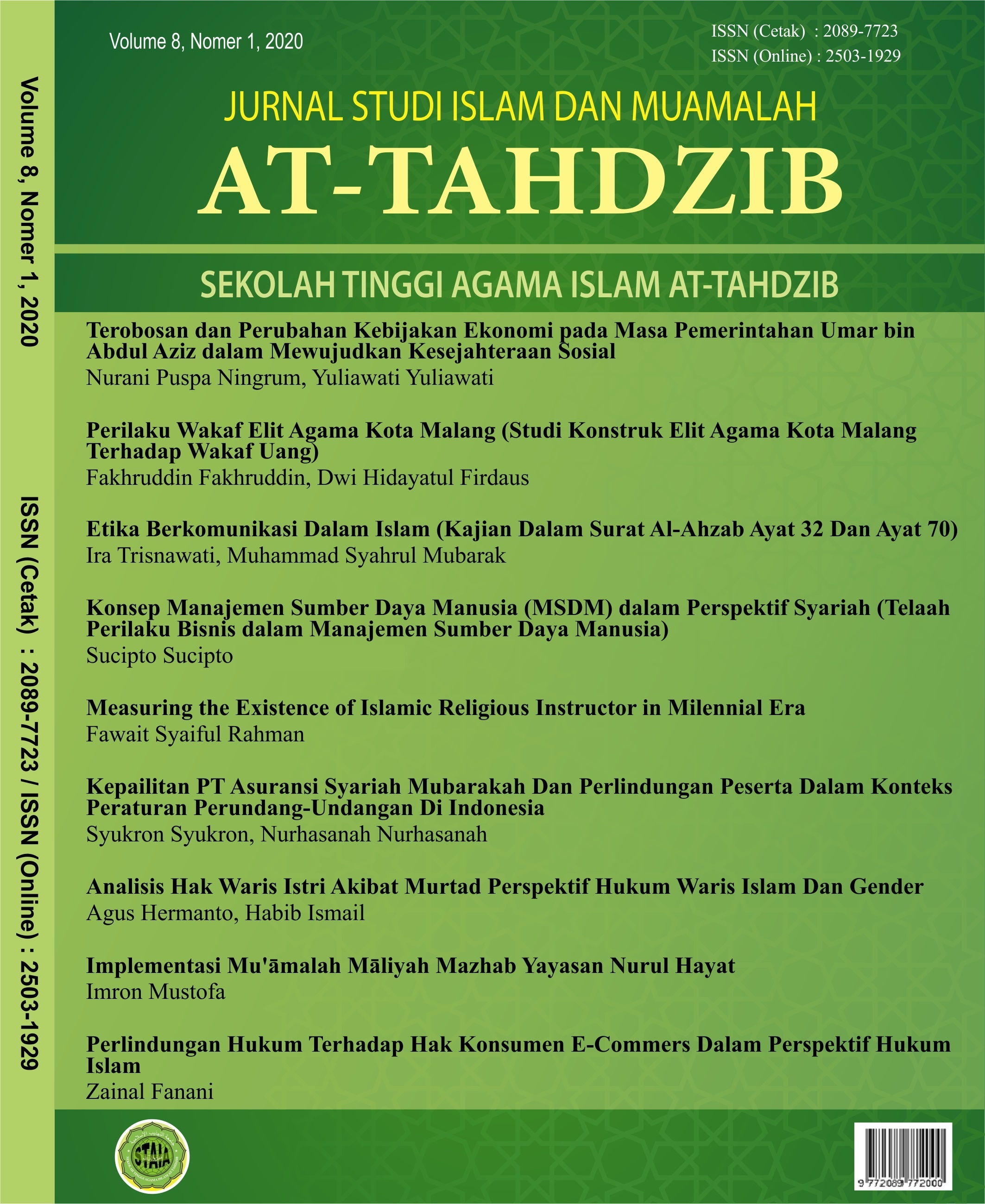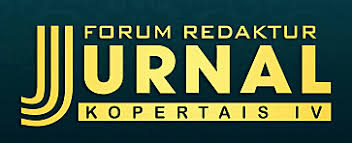Perilaku Wakaf Elit Agama Kota Malang (Studi Konstruk Elit Agama Kota Malang Terhadap Wakaf Uang)
Abstract
Waqf is also an instrument for creating justice and prosperity in the economic field. The main characteristic of endowments is when endowments have been fulfilled, then there is a shift in ownership from the owner to the ownership of Muslim communities which are expected to last and provide sustainable benefits. Waqf in the form of money (endowments of money) is seen as one way to make endowments can provide better and more results. Researchers are interested in conducting research on this waqf with a focus on looking at the behavior of the religious elites of the city of Malang in understanding and actualizing the endowments of money in their lives. In this case the religious elite of the city of Malang took samples from the Nahdlotul Ulama Organization (NU), Muhammadiyah and the Indonesian Islamic Da'wah Institute and some of the City boarding school caretakers. With the formulation of the problem 1) What are Malang City's religious elite views on the concept and implementation of cash waqf? 2) What is the appropriate format according to the religious elite of Malang City on the application of cash waqf? The type of research that will be used in this research is field research, namely research conducted in the arena or field of symptoms. With this type of research is expected to collect data and information obtained directly from respondents about the endowment of money for the religious elite in the city of Malang. The results of this study are the first religious elites of Malang City in terms of cash waqf giving legal jaiz in other words the practice of waqaf is not only dominated by the object of the object immovable waqaf, because it sees the situation and conditions that exist in society and for general welfare and not conflict with Sharia. Whereas in practice, the religious elite of Malang City has not yet carried out the mandate of the regulation stating that it must be orderly administration in terms of permits to be Nazar, deed of pledge waqaf and in cooperation with Islamic Financial Institutions (LKS). Second, the lack of information and socialization about this cash waqf, then the format that occurs in the community in applying this cash waqf is by directly giving the cash waqf property to Nazir directly. money that was forgiven. So that the religious elites of Malang also practice from what was signed above, because the contract directly from waqif explains in the contract for what the money is. As Muhammadiyah and other religious elites on that day also directly allocate the cash waqf received on the object of the contract that was explained at the time of the Waqf contract.
References
Abu Su’ud Muhammad, Risalah fi Jawazi Waqf al-Nuqud, Beirut: Dar Ibn Hazm, 1997
al-Mawardi, al-Hawi al-Kabir, tahqiq Dr. Mahmud Mathraji, Beirut:Dar al-Fikr, 1994, juz IX
Direktorat Pemberdayaan Wakaf, Pedoman Pengelolaan Wakaf Tunai. (Jakarta: Direktorat Jendral Bimbingan Masyarakat Islam, 2007
George Ritzer, Sosiologi Ilmu Pengetahuan Berparadigma Ganda, terj. Alimandan, (Jakarta: RadjaGrafindo Persada, 2004
M. Iqbal Hasan, Pokok- pokok Materi Metodologi Penelitian dan Aplikasinya , (Jakarta: Ghalia Indonesia, 2002
Muhammad Basrowi dan Soenyono, Teori Sosial dalam Tiga Paradigma, (Surabaya: Yayasan Kampusina, 2004
Nur Syam, Bukan Dunia Berbeda, Sosiologi Komunitas Islam, (Surabaya: Eureka, 2005
Pemerintah Republik Indonesia Nomor 42 Tahun 2006 Tentang Pelaksanaan Undang-Undang Nomor 41 Tahun 2004 Tentang Wakaf
Peraturan Pemerintah Nomor 28 Tahun 1977 Tentang Perwakafan Tanah Milik
Peraturan Pemerintah Nomor 42 Tahun 2006 Tentang Pelaksanaan Undang-Undang No. 41Tahun 2004 Tentang Wakaf
Peter L. Berger dan Thomas Luckman, Tafsir Sosial atas Kenyataan: Risalah tentang Sosiologi Pengetahuan (Jakarta: LP3ES, 1991). Lihat pula Berger, Langit Suci: Agama sebagai Realitas Sosial (Jakarta: LP3ES, 1991
Suparman Usman, Hukum perwakafan di Indonesia. (Jakarta: Darul Ulum Press, 1999
Undang-Undang Republik Indonesia Nomor 41 Tahun 2004 Tentang Wakaf
Wahbah al-Zuhaili, al-Fiqh al-Islami wa Adillatuhu, Damsyiq: Dar al-Fikr, 1985, juz VIII
Copyright (c) 2020 At-Tahdzib: Jurnal Studi Islam dan Muamalah

This work is licensed under a Creative Commons Attribution 4.0 International License.

Jurnal Studi Islam by At-Tahdzib is licensed under a Creative Commons Attribution 4.0 International License.
Based on a work at http://ejournal.kopertais4.or.id/mataraman/index.php/tahdzib








